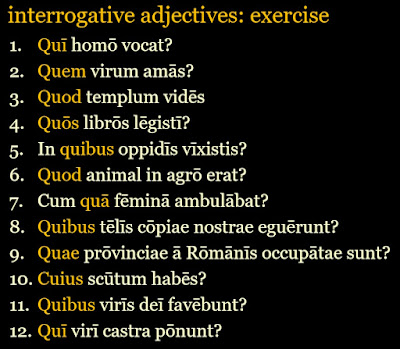Inter cēnam nōs
puerī “Quis hoc castellum dēlēvit?” inquimus. Et patruus meus “Dē
fortūnā castellī nihil cōnstat” inquit; “aetās fortasse mūrōs dēlēvit.
Sed vōs mihi respondēte. Cuius nōmen hīc praecipuō honōre habētur?”
Aqua haerēbat: nihil habuimus respondēre. Et
amita mea “Nōnne memoriā tenētis?” inquit. Tum Lȳdia, quae librum dē historiā Anglicā
in manibus nūper habuerat,
“Anglī
et Saxonēs” inquit “in hunc angulum Cantiī
cursum tenuērunt.”
Et ille “Vērum est” inquit; “nam annō
quadringentēsimō quadrāgēsimō nōnō Hengistus et Horsa ad īnsulam
Tanatim, quae tum rēvērā īnsula erat, nāvēs suās applicāvērunt.
Locus ipse duo tantum vel tria mīlia passuum ā castellō Rutupīnō iacet.”
Tum illa “Nōnne ab angulō Cantiī Anglī nōmen suum habuērunt?” Nōs puerī rīsimus. Sed amita mea “Sīc nūper affirmāvit
vir doctus. Atque nōmen ipsum Cantiī nihil aliud significat quam
prōmunturium vel angulum.” Tum patruus meus “Sed Tacitus populum Germāniae
Īnferiōris commemorat quī nōmen habēbat Anglōrum; pars Suēbōrum erant.”
Et Lȳdia “Fortasse in angulō Germāniae habitābant”
inquit. Et ille “In paenīnsulā Cimbricā rēvērā habitāsse affirmantur; et
duo illa verba ‘angulus’ et ‘Cantium’ Germānica sunt.”
Notes
[1] aqua haerēbat < aqua haeret: literally ‘the water stops’ = I am, we are etc. at a loss; haereō, -ēre [2]: stick
[2] In paenīnsulā Cimbricā rēvērā habitāsse affirmantur. │ They are claimed in fact to have lived on the Cimbrian peninsula.
habitāsse; much more will be said about this in a later post. There are two points, however, to note at the moment:
[1] this is a perfect active infinitive meaning ‘to have done’ (something)
[i] the perfect active infinitive is formed from the perfect stem: habitō, -āre, habitāvī
[ii] Remove the -ī > habitāv-
[iii] add -isse > habitāvisse │ to have lived
See also:
07.02.25: Speaking Latin on Campus (University of Dallas) [7]: notes [iv]; introduction to the accusative-infinitive
https://adckl.blogspot.com/2025/02/070225-speaking-latin-on-campus_30.html
02.06.25: Level 3; Sonnenschein; Prō Patriā [2]; Britannia Līberāta
https://adckl.blogspot.com/2025/03/020625-level-3-sonnenschein-pro-patria.html (note [iv])
31.07.25: Level 3; Sonnenschein; Prō Patriā [7]; Pax Rōmāna [3]; review: passive voice of 1st conjugation
https://adckl.blogspot.com/2025/05/310725-level-3-sonnenschein-pro-patria.html (note [2])
31.08.25: Level 1; readings [18]: Damocles’ sword; indirect statement; the accusative-infinitive
https://adckl.blogspot.com/2025/05/310825-level-1-readings-18-damocles.html
24.08.25: Level 3; Sonnenschein; Prō Patriā [8]; Castellum Rutupīnum [5]
https://adckl.blogspot.com/2025/05/240825-level-3-sonnenschein-pro-patria.html
[2] However, the author deliberately shows you a feature of some Latin verbs that are not confined to this form. It is known as syncopation and, in English, we can equate it with the term ‘contraction’ e.g. he is > he’s i.e. the omission of sounds. This occurs in Latin in a range of forms but common is the loss of -vi-. Therefore, habitāvisse (which is correct) can also appear as habitāsse.
From an earlier post in which the author uses the same perfect active infinitive but with the inclusion of -vi-
15.08.25: Level 3; Sonnenschein; Prō Patriā [8]; Castellum Rutupīnum [3]
https://adckl.blogspot.com/2025/05/150825-level-3-sonnenschein-pro-patria.html
Ex Hiberniā [i] eōs in Calēdoniam [ii] migrāvisse scrīptōrēs historicī affirmant.
> Literally: The historical writers claim [i] them [ii] to have migrated from Ireland to Scotland.
> The historical writers claim ¦ that [i] they [ii] migrated …
See also:
13.07.25: Level 3; the Labours of Hercules; [VIII] the Belt of Hippolyte, Queen of the Amazons; syncopated verb forms; elision; the descent to Hades and the dog Cerberus
https://adckl.blogspot.com/2025/04/130725-level-3-labours-of-hercules-viii.html
Exercise
This, and further sections of this text, ‘throw’ different tenses at you at the same time. Put the verbs in bold in the text (also listed below) under the appropriate heading; a few examples are given
affirmantur; affirmāvit
applicāvērunt
cōnstat
erant; est; erat; sunt
habēbant; habētur; habuerat; habuērunt; habuimus
haerēbat
iacet
respondēre; respondēte
rīsimus
significat
tenētis; tenuērunt
____________________
present: commemorat …
imperfect: habitābant …
perfect: dēlēvit …
pluperfect:
imperative:
infinitive:
Background
[1] Hengistus and Horsa: Germanic brothers who are supposed to have led the invasion of Britain in the 5th century, but nowadays considered to be mythical
https://en.wikipedia.org/wiki/Hengist_and_Horsa
[2] Cimbrī,-ōrum [2/m/pl]: a people of Northern Germany (Holstein, Jutland, Silesia); cimbricus, -a,-um: Cimbrian
https://en.wikipedia.org/wiki/Cimbri
Germania in the late 1st century AD; the Cimbri in northern Jutland
[3] Anglo-Saxons
https://en.wikipedia.org/wiki/Anglo-Saxons
https://en.wikipedia.org/wiki/History_of_Anglo-Saxon_England
https://www.britannica.com/place/United-Kingdom/Anglo-Saxon-England
https://en.wikipedia.org/wiki/Sutton_Hoo
https://en.wikipedia.org/wiki/Sutton_Hoo_helmet
reconstruction of the Sutton Hoo helmet
https://en.wikipedia.org/wiki/Anglo-Saxon_Chronicle
[a collection of chronicles concerning the history of the Anglo-Saxons, dating from the late 9th century and written in Old English]















